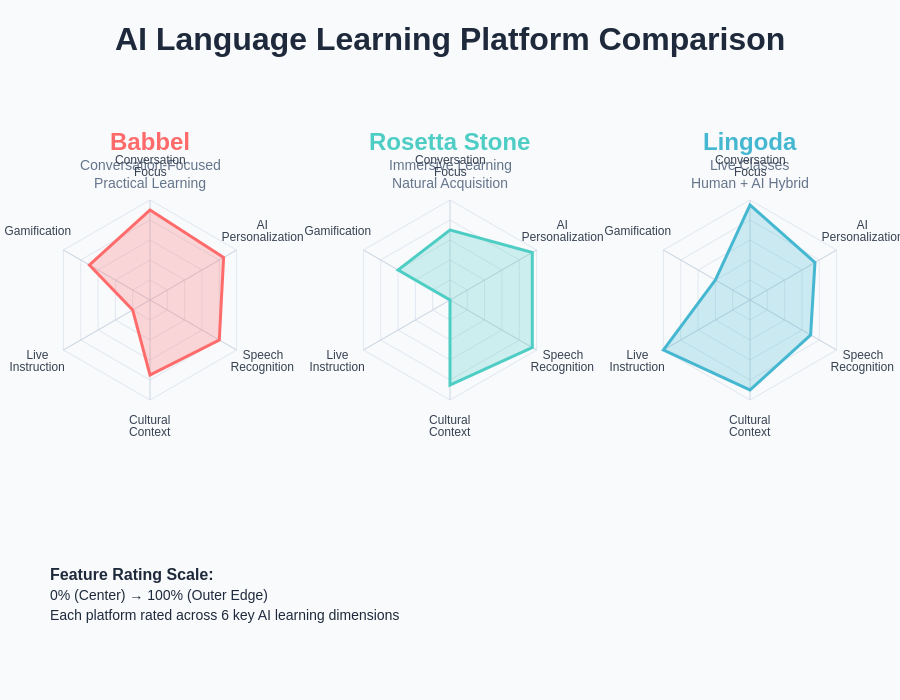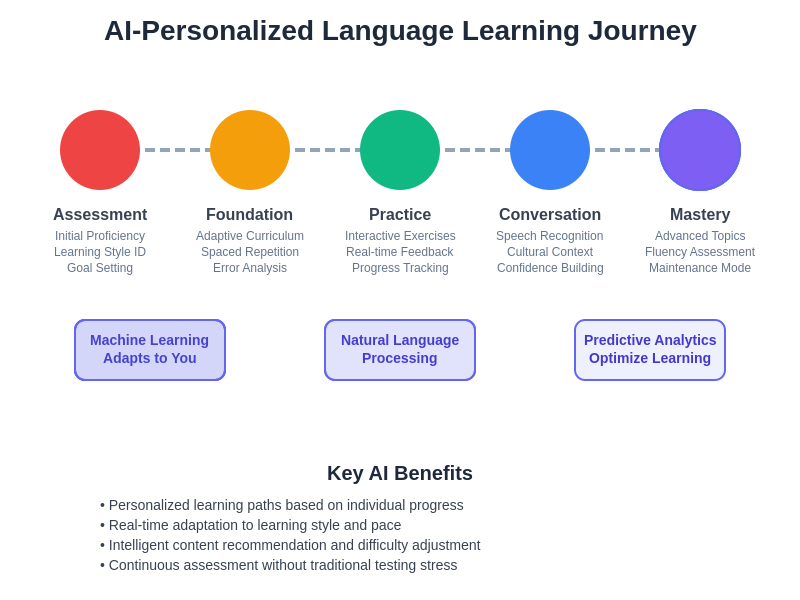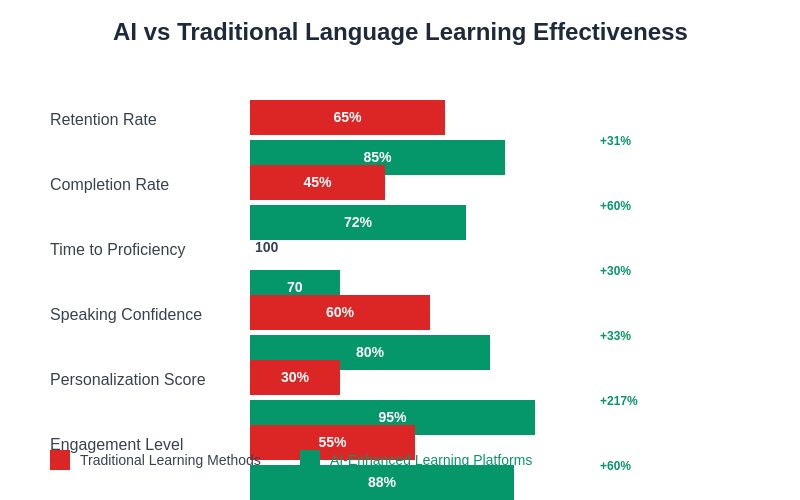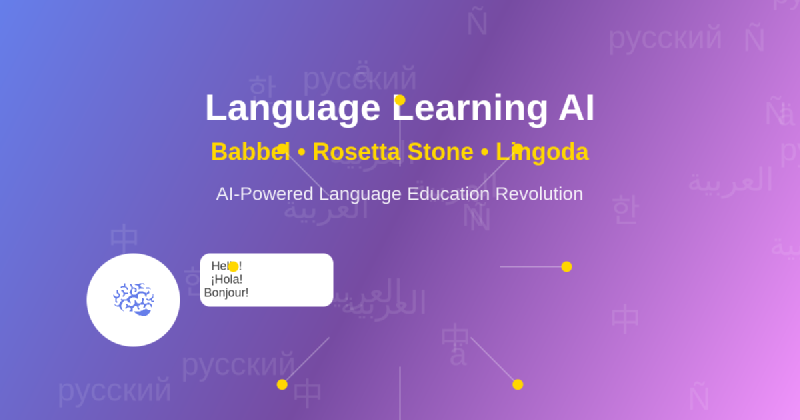The evolution of language learning has been dramatically transformed by artificial intelligence, creating unprecedented opportunities for personalized, adaptive, and efficient language acquisition. Modern AI-powered platforms like Babbel, Rosetta Stone, and Lingoda have revolutionized how millions of learners worldwide approach foreign language mastery, combining sophisticated algorithms with proven pedagogical methods to deliver customized educational experiences that adapt to individual learning styles, pace, and preferences.
Discover the latest trends in AI-powered education and explore how cutting-edge technology is reshaping traditional learning methodologies across diverse educational domains. The integration of artificial intelligence into language learning represents a fundamental shift from one-size-fits-all approaches to highly personalized educational journeys that maximize learning efficiency while maintaining engagement and motivation throughout the acquisition process.
The AI Revolution in Language Education
The application of artificial intelligence to language learning has created a paradigm shift that extends far beyond simple digitization of traditional teaching methods. Modern AI systems analyze learner behavior patterns, track progress metrics, identify knowledge gaps, and dynamically adjust content delivery to optimize retention and comprehension rates. This sophisticated approach to language education leverages machine learning algorithms that continuously evolve based on learner interactions, creating increasingly refined and effective educational experiences.
The transformation encompasses multiple dimensions of language learning, including personalized curriculum development, adaptive assessment systems, intelligent tutoring capabilities, and real-time feedback mechanisms that respond to individual learner needs. These AI-driven innovations have eliminated many barriers that traditionally hindered language acquisition, such as inflexible pacing, generic content delivery, and limited access to native speaker interactions.
Babbel: Conversation-Focused AI Learning
Babbel has established itself as a leading AI-powered language learning platform by emphasizing practical conversation skills and real-world application scenarios. The platform’s artificial intelligence engine analyzes user interactions to identify optimal learning moments, suggesting relevant vocabulary and grammar concepts precisely when learners are most receptive to new information. This sophisticated timing mechanism significantly enhances retention rates by aligning content delivery with natural cognitive patterns and learning readiness indicators.
The platform’s AI algorithms excel at creating contextually relevant learning experiences that mirror authentic communication situations. Rather than focusing solely on academic language structures, Babbel’s intelligent systems prioritize practical phrases, cultural nuances, and conversational patterns that learners will encounter in real-world interactions. This approach ensures that AI-generated lesson content remains highly applicable and immediately useful for learners seeking to develop functional communication abilities.
Babbel’s speech recognition technology represents another significant AI innovation, providing learners with immediate feedback on pronunciation accuracy and helping them develop authentic accent patterns. The system analyzes vocal patterns, identifies common pronunciation errors, and offers targeted correction exercises that address specific phonetic challenges. This personalized pronunciation coaching creates a more immersive and effective learning experience that traditionally required expensive one-on-one instruction.

The distinctive approaches of leading AI language learning platforms reveal significant variations in their technological focus and pedagogical methodologies. Each platform leverages artificial intelligence differently to address various aspects of language acquisition, from conversation practice and personalization to cultural context and live instruction integration.
Experience advanced AI learning with Claude for personalized educational support that adapts to your unique learning style and preferences. The integration of multiple AI technologies creates comprehensive learning ecosystems that support various aspects of language acquisition from vocabulary building to cultural understanding.
Rosetta Stone: Immersive AI Language Acquisition
Rosetta Stone has pioneered the immersive language learning approach, utilizing artificial intelligence to create comprehensive language environments that simulate natural acquisition processes. The platform’s AI systems analyze learner responses to visual, auditory, and contextual cues, building detailed profiles of individual learning preferences and cognitive patterns. This deep understanding enables the system to present new concepts in ways that align with each learner’s natural information processing tendencies.
The company’s TruAccent speech recognition technology exemplifies sophisticated AI application in language learning, analyzing subtle pronunciation variations and providing precise feedback that helps learners develop native-like speaking patterns. The system compares learner pronunciation against extensive databases of native speaker samples, identifying specific areas for improvement and suggesting targeted practice exercises that address individual phonetic challenges.
Rosetta Stone’s AI algorithms excel at creating intuitive learning progressions that build upon previously mastered concepts while introducing new material at optimal intervals. The system tracks retention patterns, identifies potential confusion points, and adjusts lesson sequencing to maximize comprehension and long-term retention. This intelligent approach to curriculum management ensures that learners develop solid foundations before advancing to more complex linguistic concepts.
The platform’s adaptive review system represents another significant AI innovation, automatically scheduling review sessions based on individual forgetting curves and retention patterns. By analyzing when specific concepts begin to fade from memory, the AI system can intervene at precisely the right moments to reinforce learning and prevent knowledge decay. This scientifically grounded approach to spaced repetition significantly improves long-term retention rates.
Lingoda: Live AI-Enhanced Group Learning
Lingoda has differentiated itself in the AI language learning landscape by combining artificial intelligence with live instructor-led group classes, creating hybrid learning experiences that leverage both technological sophistication and human expertise. The platform’s AI systems analyze individual learner profiles, progress patterns, and learning objectives to match students with optimal class groups and instructional approaches that maximize learning outcomes.
The platform’s intelligent scheduling algorithms consider multiple factors including learner availability, skill level, learning pace, and preferred interaction styles to create balanced class compositions that promote effective peer learning and collaborative engagement. This sophisticated matching process ensures that students are placed in learning environments where they can both contribute meaningfully to group discussions and benefit from peer interactions.
Lingoda’s AI-powered progress tracking system monitors individual performance across multiple dimensions including speaking confidence, vocabulary acquisition, grammar mastery, and cultural understanding. The system provides detailed analytics that help both learners and instructors identify areas requiring additional focus while celebrating achievements and milestones that maintain motivation throughout the learning journey.
The platform’s adaptive homework and practice assignment system utilizes AI algorithms to generate personalized exercises that reinforce concepts covered in live classes while addressing individual learning gaps. This intelligent approach to supplementary practice ensures that learners receive targeted support that complements group instruction with individualized skill development opportunities.
Enhance your research capabilities with Perplexity for comprehensive language learning resources and cultural insights that enrich your educational experience. The combination of multiple AI tools creates rich learning environments that support diverse aspects of language acquisition from basic communication skills to advanced cultural competency.
Comparative Analysis of AI Learning Approaches
The three platforms represent distinct philosophies in AI-powered language learning, each leveraging artificial intelligence to address different aspects of language acquisition and learner preferences. Babbel’s conversation-focused approach utilizes AI to prioritize practical communication skills and real-world application scenarios, making it ideal for learners seeking immediate functional language abilities for travel, business, or casual conversation.
Rosetta Stone’s immersive methodology employs AI to create comprehensive language environments that simulate natural acquisition processes, appealing to learners who prefer intuitive, discovery-based learning experiences that mirror how children naturally acquire their first language. The platform’s emphasis on visual and contextual learning makes it particularly effective for learners who benefit from non-verbal cues and environmental context.
Lingoda’s hybrid approach combines AI optimization with human instruction, creating learning experiences that benefit from both technological personalization and authentic human interaction. This approach serves learners who value community engagement, real-time feedback, and the cultural insights that come from interacting with native speakers and fellow language learners.
AI-Powered Personalization Technologies
Modern language learning platforms utilize sophisticated AI technologies to create highly personalized educational experiences that adapt to individual learner characteristics, preferences, and progress patterns. Machine learning algorithms analyze vast amounts of interaction data to identify optimal learning pathways, predict potential difficulty areas, and suggest interventions that maintain engagement while maximizing educational outcomes.
Natural language processing technologies enable these platforms to understand learner responses, assess comprehension levels, and provide contextually appropriate feedback that guides improvement efforts. These systems can analyze written responses, evaluate speaking patterns, and assess listening comprehension to create comprehensive profiles of learner abilities and areas requiring additional support.
Adaptive testing algorithms continuously assess learner progress without creating the stress and artificial constraints associated with traditional testing methods. These systems present challenges at appropriate difficulty levels, adjust question complexity based on performance patterns, and provide immediate feedback that reinforces correct responses while gently correcting misunderstandings.
Speech Recognition and Pronunciation Training
The integration of advanced speech recognition technology represents one of the most significant AI contributions to language learning, providing learners with immediate, objective feedback on pronunciation accuracy and speaking patterns. These systems analyze multiple acoustic features including phoneme production, stress patterns, intonation curves, and rhythm patterns to provide comprehensive assessment of speaking abilities.
Modern speech recognition algorithms can identify subtle pronunciation errors that might escape notice in traditional classroom settings, offering targeted correction strategies that address specific phonetic challenges. The systems compare learner pronunciation against extensive databases of native speaker samples, providing precise feedback that helps develop authentic accent patterns and natural speaking rhythms.
The AI-powered pronunciation training systems adapt to individual vocal characteristics, accounting for natural voice variations while maintaining standards for accurate phoneme production. This personalized approach ensures that learners receive feedback appropriate to their vocal range and natural speaking patterns while still guiding them toward clear, comprehensible pronunciation.
Intelligent Content Curation and Delivery
AI algorithms excel at curating and delivering learning content that matches individual learner interests, proficiency levels, and learning objectives. These systems analyze learner preferences, track engagement patterns, and identify topics that generate sustained interest and motivation. By presenting relevant, engaging content, AI systems maintain learner attention while ensuring that educational objectives are consistently met.
The intelligent content delivery systems adjust presentation formats, pacing, and complexity based on real-time assessment of learner comprehension and engagement levels. When systems detect confusion or disengagement, they can automatically provide additional explanations, alternative presentation methods, or supplementary practice opportunities that address specific learning challenges.
Dynamic curriculum adaptation represents another significant AI contribution, allowing learning pathways to evolve based on individual progress patterns and changing learning objectives. These systems can accelerate progression when learners demonstrate mastery, provide additional reinforcement when concepts prove challenging, and introduce advanced topics when learners show readiness for increased complexity.

The AI-driven learning progression demonstrates how artificial intelligence orchestrates comprehensive language acquisition through carefully sequenced stages that build upon previous knowledge while introducing new challenges at optimal moments. This systematic approach ensures that learners develop solid foundations before advancing to more complex linguistic concepts and real-world applications.
Gamification and Motivation Through AI
Artificial intelligence has transformed gamification in language learning by creating personalized reward systems, achievement pathways, and engagement mechanisms that adapt to individual motivation patterns. AI algorithms analyze learner behavior to identify optimal reward timing, preferred achievement types, and engagement strategies that maintain long-term commitment to language learning goals.
The systems create personalized challenges that balance difficulty with achievability, ensuring that learners experience regular success while being appropriately challenged to continue developing their abilities. This careful calibration of challenge levels prevents frustration while maintaining engagement through meaningful progress recognition.
AI-powered social features connect learners with compatible study partners, create collaborative learning opportunities, and facilitate peer support networks that enhance motivation through community engagement. These systems consider personality types, learning preferences, and progress levels to create productive learning partnerships that benefit all participants.
Cultural Context and Pragmatic Learning
Advanced AI systems increasingly incorporate cultural context and pragmatic understanding into language learning experiences, recognizing that effective communication requires more than grammatical accuracy and vocabulary knowledge. These systems analyze cultural patterns, social conventions, and contextual appropriateness to help learners develop comprehensive communicative competence.
The AI algorithms can identify situations where cultural knowledge significantly impacts communication effectiveness, providing targeted instruction on social norms, conversational conventions, and cultural expectations that influence successful interaction. This cultural intelligence component helps learners navigate real-world communication situations with confidence and appropriateness.
Pragmatic learning systems analyze conversation patterns, identify implied meanings, and teach learners to recognize subtle communication cues that carry important contextual information. This sophisticated approach to language instruction prepares learners for authentic communication situations where understanding extends beyond literal interpretation.
Assessment and Progress Tracking Innovation
AI-powered assessment systems provide comprehensive, continuous evaluation of learner progress across multiple skill dimensions including vocabulary knowledge, grammatical understanding, listening comprehension, speaking ability, and cultural awareness. These systems eliminate the limitations of traditional testing methods by providing ongoing, authentic assessment that integrates seamlessly with learning activities.
The intelligent analytics systems create detailed progress reports that identify specific areas of strength and opportunities for improvement, enabling learners to focus their efforts on areas that will yield the greatest learning gains. These systems track micro-improvements that might be imperceptible to learners themselves, providing encouragement and validation for incremental progress.
Predictive analytics capabilities enable these systems to anticipate potential learning challenges before they become significant obstacles, suggesting preventive interventions and additional support resources that maintain learning momentum. This proactive approach to learning support significantly improves completion rates and long-term success outcomes.

The quantitative improvements achieved through AI-enhanced language learning platforms demonstrate substantial advantages across multiple performance indicators. AI-powered systems consistently outperform traditional methods in retention rates, completion rates, time efficiency, speaking confidence, personalization effectiveness, and overall learner engagement levels.
Integration with Emerging Technologies
The future of AI-powered language learning increasingly involves integration with emerging technologies including virtual reality, augmented reality, and advanced conversational AI systems. These integrations create immersive learning environments that simulate authentic cultural and linguistic contexts while providing safe spaces for experimentation and skill development.
Virtual reality applications transport learners to realistic scenarios where they can practice language skills in contextually appropriate environments, from ordering food in restaurants to conducting business meetings in professional settings. These immersive experiences provide valuable practice opportunities that bridge the gap between classroom learning and real-world application.
Conversational AI systems are becoming increasingly sophisticated, providing learners with access to intelligent tutors that can engage in natural dialogue while providing gentle correction and guidance. These systems offer unlimited conversation practice opportunities that adapt to learner interests and proficiency levels.
Future Directions in AI Language Learning
The continued evolution of artificial intelligence promises even more sophisticated and effective language learning experiences that incorporate advances in natural language understanding, emotional intelligence, and personalized education. Future systems will likely demonstrate enhanced ability to understand learner emotions, motivation states, and cognitive load, providing more nuanced and responsive educational support.
The development of more advanced AI tutoring systems will enable even more personalized instruction that rivals the effectiveness of one-on-one human tutoring while maintaining the scalability and accessibility advantages of digital platforms. These systems will incorporate deeper understanding of individual learning psychology and cognitive patterns.
The integration of AI language learning systems with broader educational ecosystems will create comprehensive learning environments that support learners throughout their educational and professional journeys. These integrated approaches will provide seamless transitions between different learning contexts and continuous support for ongoing skill development.
The democratization of high-quality language education through AI technology continues to expand access to effective learning resources regardless of geographical location, economic circumstances, or scheduling constraints. This accessibility revolution has profound implications for global communication, cultural exchange, and economic opportunity.
Disclaimer
This article is for informational purposes only and does not constitute professional advice. The views expressed are based on current understanding of AI technologies and their applications in language learning. Individual results may vary based on personal learning styles, commitment levels, and specific language learning goals. Readers should evaluate multiple platforms and consider their individual needs when selecting language learning solutions.
